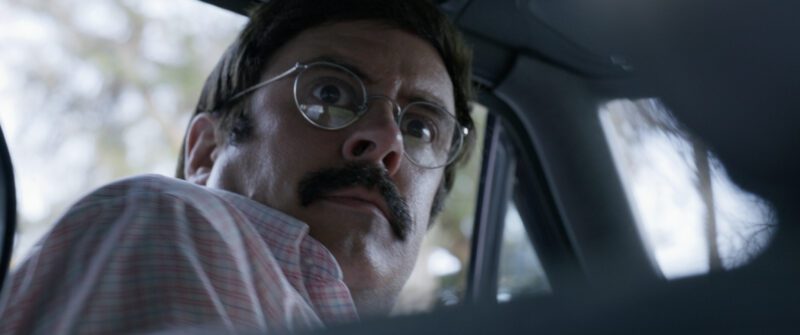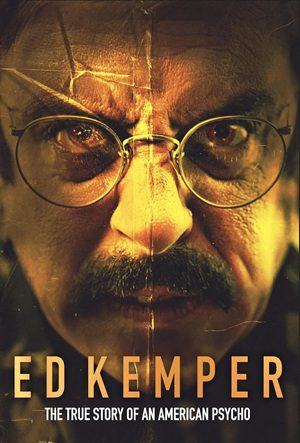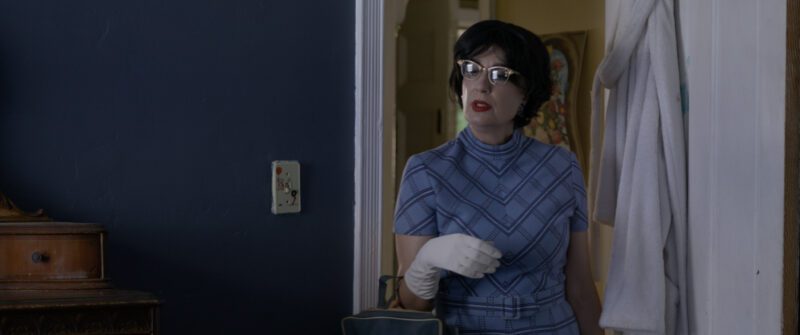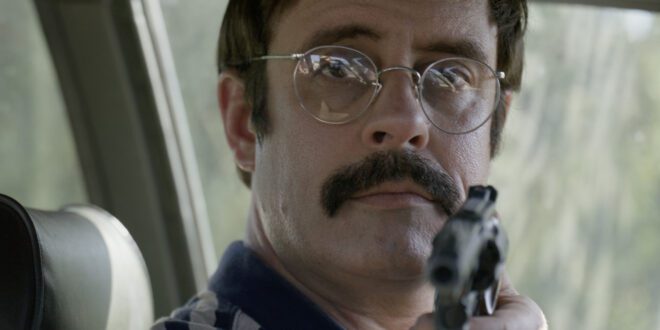With the upcoming release of Ed Kemper, screenwriter Stephen Johnston dives headfirst into the dark psyche of one of America’s most notorious serial killers. Known for his work on Ted Bundy and The Hillside Strangler, Johnston isn’t new to true crime — but Ed Kemper marks a bold new chapter. Teaming up with director (and co-writer) Chad Ferrin, Johnston blends raw, punk-inspired horror with grounded psychological storytelling, offering a chilling yet human look at a man shaped by trauma and driven to kill.
As Ed Kemper gears up for its theatrical release on April 4, 2025, followed by a VOD rollout on April 8, we asked Johnston about creative choices, moral boundaries, and what it takes to write horror that hits hard — and stays with you. Ed Kemper stars Brandon Kirk as the titular killer, Susan Priver as Ed’s mother, and also features Lew Temple, Robert Miano, Brinke Stevens, Cassandra Gava, and Erin Luo.
Interview with Stephen Johnston on Ed Kemper (2025)
PopHorror: Obviously, there are many different topics to write about, and even many different serial killers. What narrowed you down to choosing the story of Ed Kemper, and how did you approach balancing factual accuracy with creating a compelling narrative?
Stephen Johnston: I have written several different movies at this point, starting with erotic thrillers like Tell Me No Lies, and a police drama Officer Down (aka Assassin in Blue), and my last movie release was a kid’s movie C.I.Ape, and I even have a forthcoming Re-Animator sequel, Re-Animator Unbound. The serial killer thing seemed to have tapped a vein, so to speak, starting with Ed Gein, followed by Ted Bundy, then Hillside Strangler, Starkweather, and now of course, Ed Kemper.
As I originally wrote Kemper like twenty years ago, it’s hard to remember its exact origins, but after we’d had our initial success, producer Mike Muscal suggested we find another project to do, and it may very well have been Mike who suggested Kemper. Kemper seemed like a logical subject to tackle, not least because he was much less known than the other serial killers I’d written about, and his story contained a whole different sort of energy, if that makes sense.
As for balancing factual accuracy, I may sometimes take a little artistic license, but I always tell the “story” as factually as possible, and Kemper’s story is pretty damned compelling to begin with!
PopHorror: Someone I know named Katie had to ask: Did you correspond with the real Ed Kemper in researching this writing project?
Stephen Johnston: I didn’t correspond with Kemper, largely because my assumption is these guys are narcissists and will inevitably try to insert themselves into the project in some way, and since I’m not writing a non-fiction book, I don’t see the necessity. Although, I did once consider contacting Ian Brady in preparation for a forthcoming Moors Murders project.
Ed Kemper and “Punk Rock Energy”(?!)

PopHorror: You described envisioning Ed Kemper with a ‘punk rock horror energy.’ Can you elaborate on what that means and how it shaped the script’s tone and pacing?
Stephen Johnston: I suppose if we imagine the previous serial killer projects I’d written as “modern,” then Kemper exists more in the “post-modern” realm. Like I say, after the previous projects I’d written, I wanted to tell a narrative that was sort of stripped-down, visceral and propulsive, not dissimilar to a punk rock song. And Kemper’s story lent itself to being told that way. If we imagine Ed Gein was like a Universal monster movie, then Kemper is Hammer version with color and blood!
PopHorror: How did your experience working on Ted Bundy and The Hillside Strangler influence your approach to writing Ed Kemper’s story?
Stephen Johnston: I guess it sort of goes back to my answer to the previous question; by the time I got around to writing Kemper I had some experience with this kind of subject matter, and I suppose had developed a bit of intuition about how to approach the narrative. Who knows, had I started this strange journey writing Kemper, maybe my approach would’ve been more timid, and less punk rock. (There I go using that analogy again.)
Even though they’re all serial killer movies, each of these guys have their own distinct, if abhorrent personality, and I try to approach the narrative accordingly. By the time I got to Kemper I had the experience to recognize that, and the ability to tell the story the way it needed to be told. Or, at least I hope so…
To the Critics…
PopHorror: True crime can be emotionally intense. What do you say to those who inevitably critique such stories for allegedly glorifying the violence?
Stephen Johnston: I’ve encountered that response on occasion, and while not entirely unsympathetic, I find it a sort of misdirected criticism. It’s kind of like accusing Steven Spielberg of glorifying the Nazis by making Saving Private Ryan. Not to come across as grandiose as that comparison probably sounds!
I just think if you’re telling a horrific story about a person perpetrating heinous acts, you’re almost obligated to portray the events as honestly as possible. Real monsters walk amongst us, and pretending they don’t doesn’t make us any safer. As James Hetfield from Metallica once said, “Honesty is my only excuse!”
PopHorror: What challenges did you encounter in bringing Ed Kemper’s complex psychology to life on screen?
Stephen Johnston: This is perhaps a question best addressed by Brandon especially, or Chad, but I think the thing that makes these sorts of movie interesting, beyond the obvious scare/shock sort of thing is making the character believable. I love Halloween or Friday the 13th, but nobody thinks those characters represent real people. At least I hope they don’t.
Serial killers are, in their own perverse way, rooted in reality, and I think that reality is horrifying. What’s specifically interesting about Kemper is he’s surprisingly blunt and upfront about his own acts, which sort of makes telling his story a little “easier.”

Chad Ferrin’s Style
PopHorror: Chad Ferrin has a distinct, gritty filmmaking style. How did his vision align with or differ from your original concept?
Stephen Johnston: That’s a beautiful question, and here’s the equally beautiful answer: It aligns perfectly with my original concept. Chad identifies as a horror filmmaker, so he approached the material the way it was written: as a horror movie. If you read Fango back in the day, there was this pushback against horror with, “It’s really psychological horror.” At some point that character study idea has to bleed into horror movie territory. Chad realized that perfectly.
PopHorror: Given the subject matter, was there a particular scene or moment that was especially difficult to write or watch come to life?
Stephen Johnston: Always. I can’t point out any specific scene or moment, but I’m always sensitive to the idea that the narrative might be moving into a form of violence pornography, or especially disrespect the victims and their families. As I expressed before, I struggle to approach the material as honestly as possible, and while I realize using the word, “sensitive,” in context sounds almost satirical, I do at least struggle to make sure we don’t cross into the territory of the exploitative.
Although, I do love movies otherwise defined as “exploitation.” Also, as an adjunct to the conversation, sometimes I write overly-extreme, because I know when abjections are raised, I can pull-back into a place more comfortable to the “suits.” This is a strategy well known to all horror filmmakers and writers.
Mommy Issues

PopHorror: The focus isn’t just on the killer, but also his mother, who is quite frequently blamed for Ed’s crimes. In writing this story, were there any real-life details about her that people should know about?
Stephen Johnston: Well, it’s the original Oedipal concept, right? Freud defined it, and Kemper made it explicit. There’s the “nature versus nurture” argument, and I think had Kemper had a more… “loving mother,” maybe he wouldn’t have become such a monster. I’m not trying to blame her, but there is a reality that she never showed her son anything that might be considered a maternal instinct, and even when she did, it was more in the form of expecting to be glorified as, “Mother.” And Danzig has warned us about the evils of Mother.
PopHorror: With Dorothea and Richard Ramirez on the horizon, will you be tackling these upcoming stories, or will they be written by others?
Stephen Johnston: Chad’s already done Dorothea, which is fantastic, by the way, and I think he’s deep in Ramirez. The unfortunate reality is the world continues to produce these monsters, so we’ll never lack for subject matter.
PopHorror: If you could explore another infamous true crime case, which one would it be and why?
Stephen Johnston: Oddly enough, the next project coming down the pike is my Moors Murders movie, due to shoot in the U.K. Other than that, Re-Animator Unbound, which is very much not rooted in true crime, nor any truth of any kind!
Thank you for your time, Stephen! You can rent and own Ed Kemper (2025) on Vudu/Fandango and other digital platforms now.
 PopHorror Let's Get Scared
PopHorror Let's Get Scared




